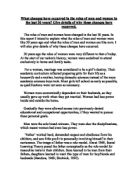Moreover, according to Boserup (1981), rapid population growth should be bad for economic performance, because of a larger population each worker will have fewer productive factors to work with. What is more, more population means products have to be shared by more people. By way of illustration, during 1960s and 1970s in China, the economy did not develop smoothly because population explosion. Under this macroscopic environment, the central government had to use Planned Economy System to ensure the supply and the distribution of products. Consequently, modern business was not able to grow and develop during this period in China Mainland (Lin and Chao, 1986)
Accordingly, it seems clear that if the population keep growing rapidly in a nation (especially in developing countries), it is almost impossible for the economy to go smoothly with a heavy population burden. In addition, without a strong purchasing power, business could hardly entre a rapid development. On another hand, population decline which has occurred in some developed countries might lead to a lack of labor force. This phenomenon would also affect business negatively in the future.
2.2 Population aging
Population aging (also known as demographic aging) is expected to be one of the most considerable global demographic trends in the 21st century. Leonid A. Gavrilov and Patrick Heuveline defined population aging as:
“A summary term for shifts in the age distribution (i.e., age structure) of a population toward older ages. It occurs when the age of a country or region rises due to rising and/or declining .”
We have noticed that population aging has already occurred in many industrialized regions with different degree. For the world as a whole, the elderly will grow from 6.9% of the population in 2000 to a projected 19.3% in 2050 (Table 1). Namely, it shows that this trend might continue over the next few decades, eventually affecting the entire world.
Consequently, such an unprecedented phenomenon would also affect negatively on business in the future. Bakshi and Zhiwu Chen (1994) have argued that contemporary business tends to suffer most from a labor shortage in a population-aging society, especially for small businesses. Enterprises have to face the capital constraints which would restrain their ability to compete on higher wages. If companies keep raising wages in order to attract enough workers without a higher productivity in return, their profits would decrease considerably. In addition, if corporations continue to stick with worker shortage, their output would decline as a result. With productive capacity shrinking as the traditional labor force declines, corporations could hardly ensure sufficient resources to deal with the rising cost.
2.3 International migrant
International migrant tends to be a common phenomenon in the world today. It is not difficult to understand that the same worker can earn very different wages depending on the country in which they work. To demonstrate this, a large number of immigrants from poor countries moved to rich countries to work (Clemens, Claudio E. and Lant P., 2009). Some developing countries even encourage their citizens to work abroad. For instance, the central government of Philippines makes emigration as a part of its national development strategy (Lindahl and Landberg, 1994).
Furthermore, at present, international immigrations usually provide the companies in destination countries with cheaper workforce. According to the data provided by Moretti and Enrico (2004), immigration had small negative effect on the average wages of destination countries, with 0.7% in the USA and 0.8% in UK. However, employing foreign workers would increase the cost of training to local firms, such as the training about language and new enterprise Culture. From the above information, we could see that immigrants are not always beneficial to native corporations. Furthermore, some other negative impact of migrant on local business might occur in the future. For example, people have to spend more time and money on coordinating social relations because of cultural shock.
3.0 Conclusion
In conclusion, this essay has investigated that the global demographic changes which include population growth, demographic aging and international migration, would influence negatively in terms of business development. Generally speaking, these changes may lead to higher labor costs which should not be ignored by enterprises. Global demographic changes are not only demographic problems but also economic issues. , enterprises should assess the new trends in the near future, and search for an appropriate response.
References
Bakshi, G. and Chen Zhiwu (1994) "Baby Boom, Population Aging, and Capital Markets”, The Journal of Business, Vol.67, No.2 Apr., 1994, pp. 165-202
Boserup, E. (1981). Population and Technological Change: A Study of Lone-Term Trends. Chicago: University of Chicago Press.
CIA World Factbook (2012). Available at: September 2012)
Clemens, A., Claudio, E. and Lant, P. (2009). The Place Premium: Wage Differences for Identical Workers Across the U.S. Border. Center for Global Development Working Paper.
Lindahl, K. and Landberg, H. (1994). Population, Economic Development and the Environment. Oxford: Oxford University Press.
Leonid, A. G. and Patrick, H. (2003). The Encyclopedia of Population. New York: Macmillan Reference
Lin, W. and Chao, A. (1986). China's economic reforms. Philadelphia : University of Pennsylvania Press.
Moretti, C. and Enrico, P. (2004). Workers, Education, Spillovers and Productivity: Evidence from Plant-Level Production Functions. American Economic Review. 94 (3), pp. 656-690.
Poston, D.L. and Bouvier, L.F. (2010). Population and Society: an introduction to demography. Cambridge: Cambridge University Press.
Appendix:
Table 1. Dynamics of Population Aging in the Modern World
Observed and Forecasted Percentages of the Elderly (65+ years) in Selected Areas, Regions, and Countries of the World: 1950, 2000 and 2050.
Source: United Nations 2001.
Moretti, C. and Enrico, P. (2004). Workers, Education, Spillovers and Productivity: Evidence from Plant-Level Production Functions. American Economic Review. 94 (3), pp. 656-690.








